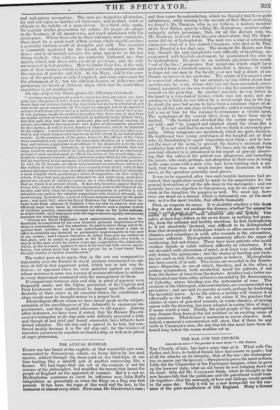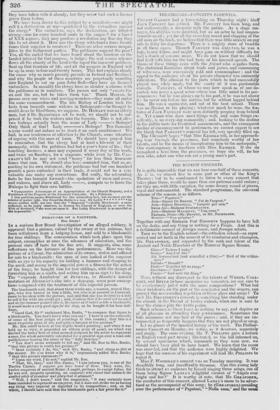THE BAR AND THE CHURCH. ABRAHAM DES — "Put powder in their
drink !"—The Tailors.
THE Church, of late, has had a sorry time of it. What with Ca- tholics and Jews, its boldest friends have had reason to quake ; but of all.the attacks on its integrity, that of the bar—the innkeepers bar, we mean, not the lawyers'—threatens to prove the most serious. Little did the Chancellor of the Exchequer imagine, when he gave up the brewers' duty, what an old house he was bringing down on his head : little did Mr. CALCRAFT think, when he brought in his new licence-bill, that the publicans and the priesthood would tum- ble together—that the monopoly of beer and bishops would perish in the same day. Truly it will be a new licence-bill for the ene- mies 'of the poor constitution of Old England. Many a licence
they have taken with it already, but they neve:• had such a licence given them before. We have been drawn to this subject by a manifesto—we might call it a declaration of war—published by the victuallers against the clergy.* The victuallers, says the declaration, are 200,000 strong—one for every hundred souls in the empire ! for a barrel of XXX a-piece, they may produce a revolution any fine day they like to set about it. . How can the clergy•withstand a force twenty times their superior in numbers ? There are other serious inequa- lities in the belligerent parties. The publicans support the poor! Yes, all the racket that we have heard about the burdens on the landed interest for that purpose, is fudge ; the real source whence flows all the charity of the land is the tap of the innocent publican. Seal up that fountain of life, and all the paupers in England will be up in arms in four-and-twenty hours. This fact explains clearly the cause why so much poverty prevails in Ireland and Scotland, and why the people of these countries are perpetually crowding into England to eat up poor John Bull—they have no licensed victuallers. In morality the clergy have as slender a chance with the publicans as in numbers. The parson not only " covets the ox and the ass, but he takes them too." Thank Heaven, he passes over our wives and serving-wenches—they come all under the same commandment. The late Bishop of London took the beds from beneath some widows in Bishopsg,ate—he thought he could do as be liked there, we suppose. Dr. HOWLEY was an elderly man, but if Dr. BLOMFIELD set to work, we should not be sur- prised if he took the widows into the bargain. This is not two bishops actually bear the name of Lady 's Bishops! Only think of that ! Lady 's Bishops! Ten thousand
a-year would .not induce us to frock it on such conditions.t We had, in our tenderness of affection to the Church, some intention of arguing with this man of foam. We should have prayed him VI remember, that the clergy had at least a life-rent of their monopoly, while the publican had but a year's lease of his ; that touching licences, a man may expound it every day of the week, and twice on Sundays, for a sixpence, while even by Mr. CAL- cRAFT's bill he may not vend "heavy" for less than fourscore times that sum. We should also have reminded him, that as, ac- cording to his own statement, the publicans had but one hundred pounds a piece embarked- in their trade, it could not be a very valuable one under any restrictions. But really, the astounding facts he has broUght forward—the spoliation of oxen and asses,
and widows, and above all, Lady , compels us to leave the Bishops to fight their own battles.
* Comparative Advantages of an Appropriation of the Church Property, and a Forfeiture of the Property of the Licensed Victualler. By a Publican.
t Our publican quotes Blackwood for this astounding fact, but we must put the retailer of porter r,ight. Our friendthe Bailie is a wag. By Leddy « * * * * ** he means neither more nor less than the " Magazine "—Gaddy Blackwood; a name sufficient, as he justly observes, to destroy the Church of England, or even the Kirk, of Scotland,-icahe were set it. But Leddy Blackwood is as merciful as she is powerful."'



















 Previous page
Previous page